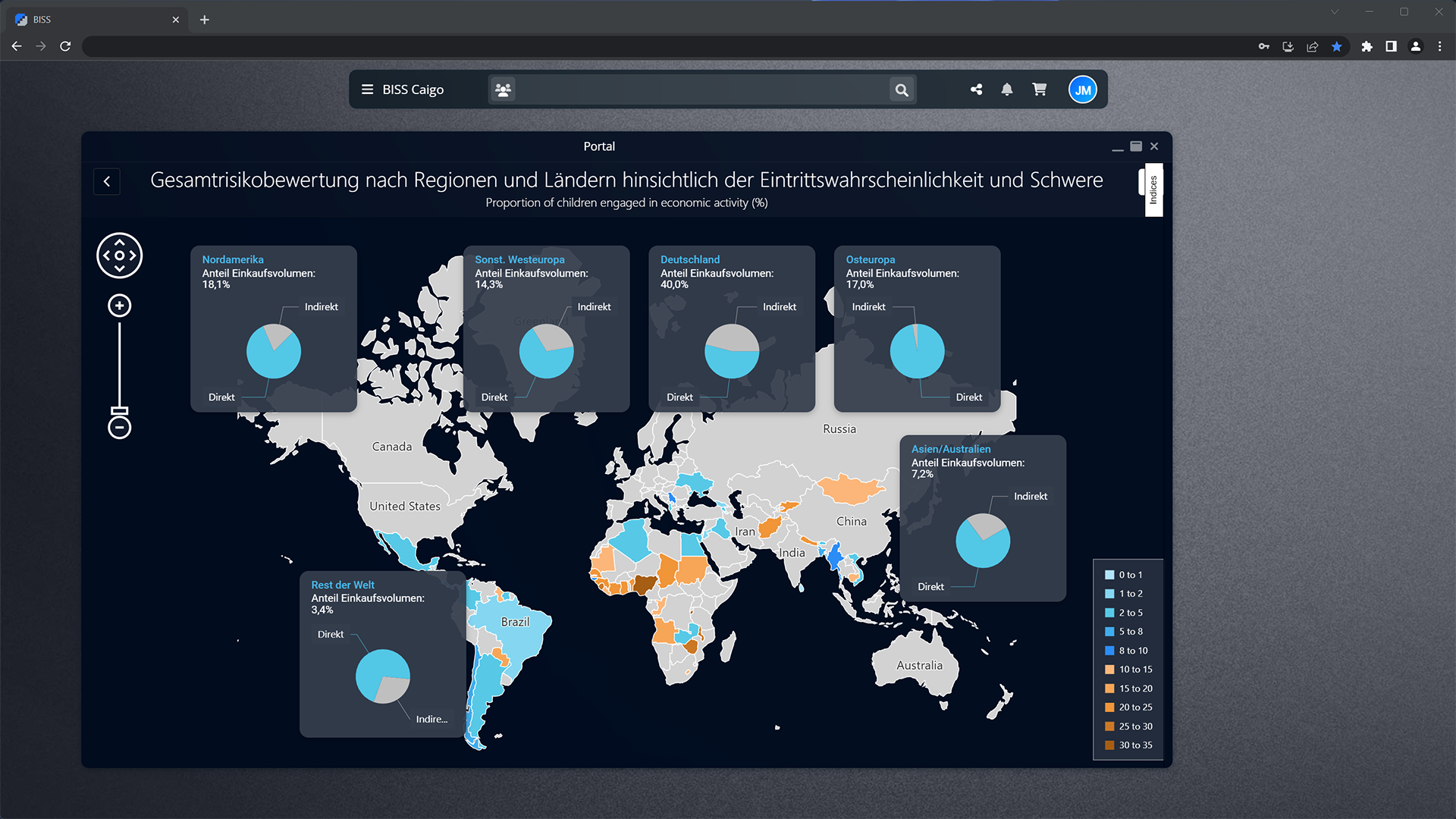Comply with the LkSG / CSDDD with the BISS/CAIGO software—the holistic solution in the cloud!
From 2024, the German Supply Chain Due Diligence Act (LkSG) will be mandatory for companies with 1,000 or more employees. In the future, the Corporate Sustainability Due Diligence Directive (CSDDD, also known as CS3D) is also expected to come into force at EU level. This directive includes the requirements of the LkSG and even goes beyond them.
To implement the LkSG/CSDD, you need intelligent technical support—advanced LkSG software. BISS/CAIGO is a unique cloud-based, SaaS LkSG software for the largely automated and legally compliant fulfillment of your due diligence obligations. With this powerful software, you can manage LkSG/CSDD implementation along entire supply chains.
Comply with the LkSG / CSDDD with the BISS/CAIGO software—the holistic solution in the cloud!
From 2024, the German Supply Chain Due Diligence Act (LkSG) will be mandatory for companies with 1,000 or more employees. In the future, the Corporate Sustainability Due Diligence Directive (CSDDD, also known as CS3D) is also expected to come into force at EU level. This directive includes the requirements of the LkSG and even goes beyond them.
To implement the LkSG/CSDD, you need intelligent technical support—advanced LkSG software. BISS/CAIGO is a unique cloud-based, SaaS LkSG software for the largely automated and legally compliant fulfillment of your due diligence obligations. With this powerful software, you can manage LkSG/CSDD implementation along entire supply chains.
With BISS/CAIGO, you can easily implement the Supply Chain Due Diligence Act (LkSG)
- You recognize the risk profiles of your supply partners
- You prioritize risks and counteractive measures
- You manage risks of complete(!) supply chains
- You implement the measures for risk elimination
- You receive support in the legally required annual effectiveness review of your measures
- You fulfill the reporting obligation to Bafa
Your decision for BISS/CAIGO is future-proof
BISS/CAIGO already meets the EU requirement to review entire supply chains from 2026/2027. In addition to direct supply partners, indirect supply partners will also have to undergo a risk analysis.
With BISS/CAIGO, you are therefore opting for a future-proof solution now.
With BISS/CAIGO you keep the overview!
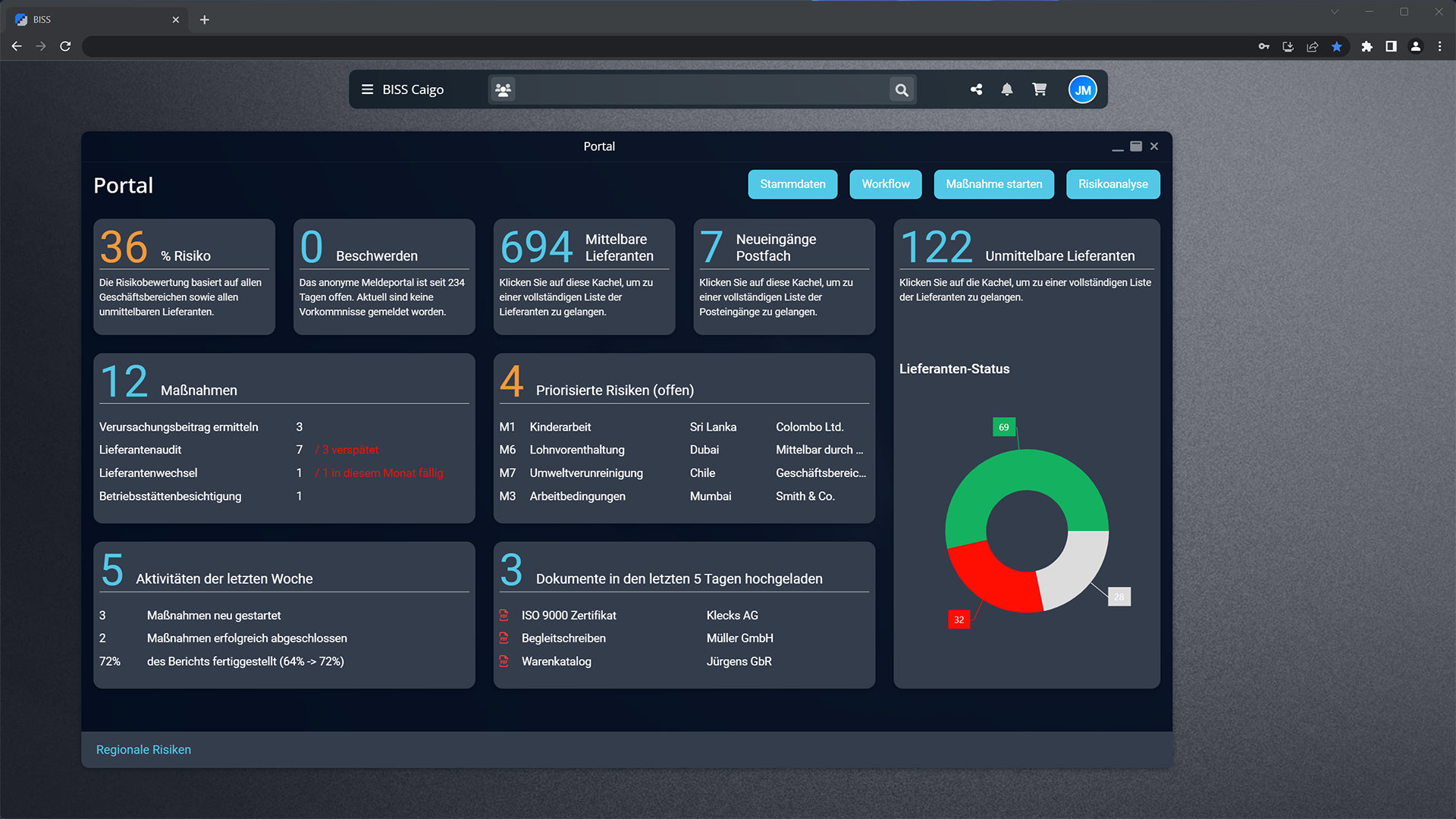
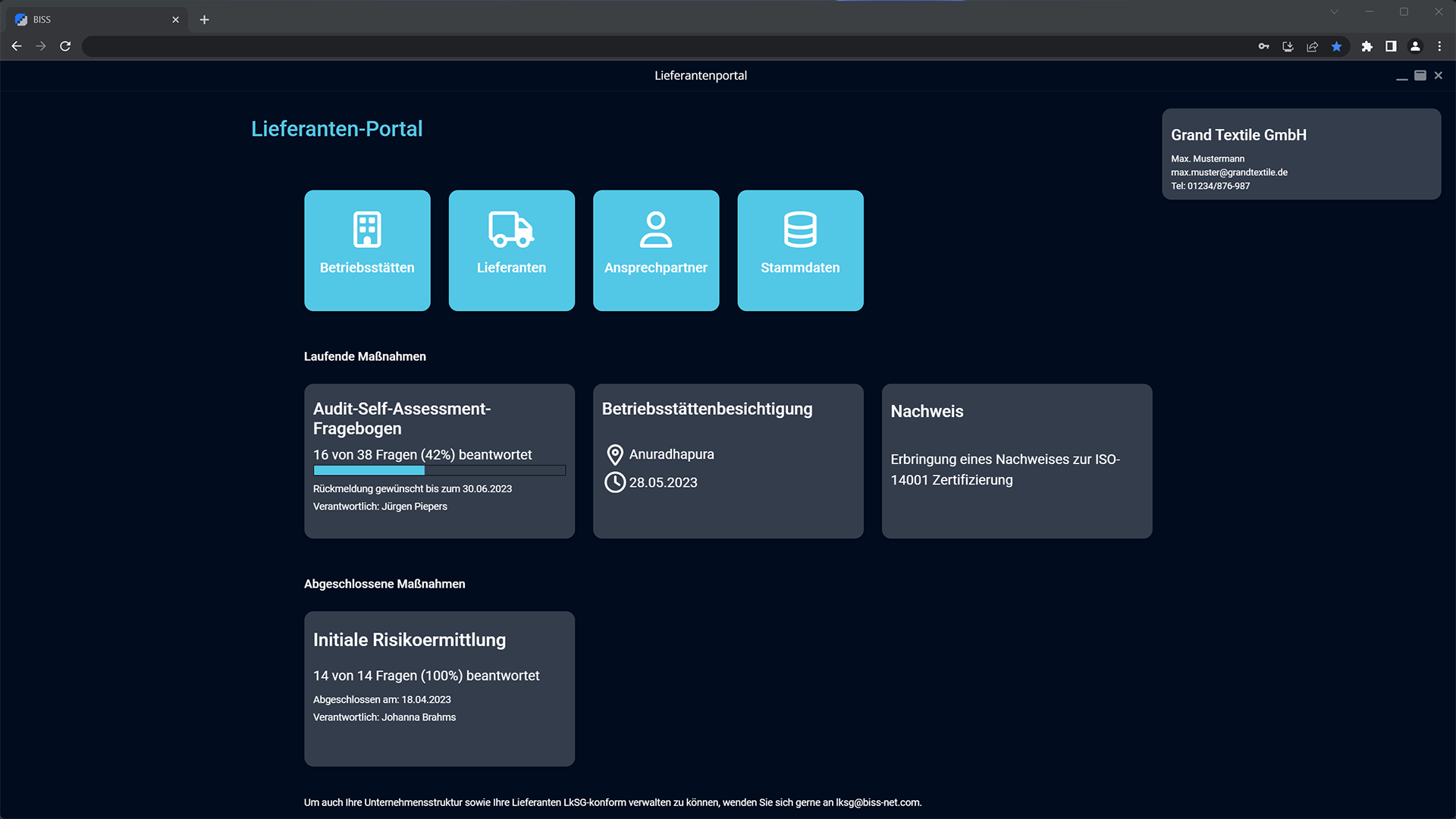
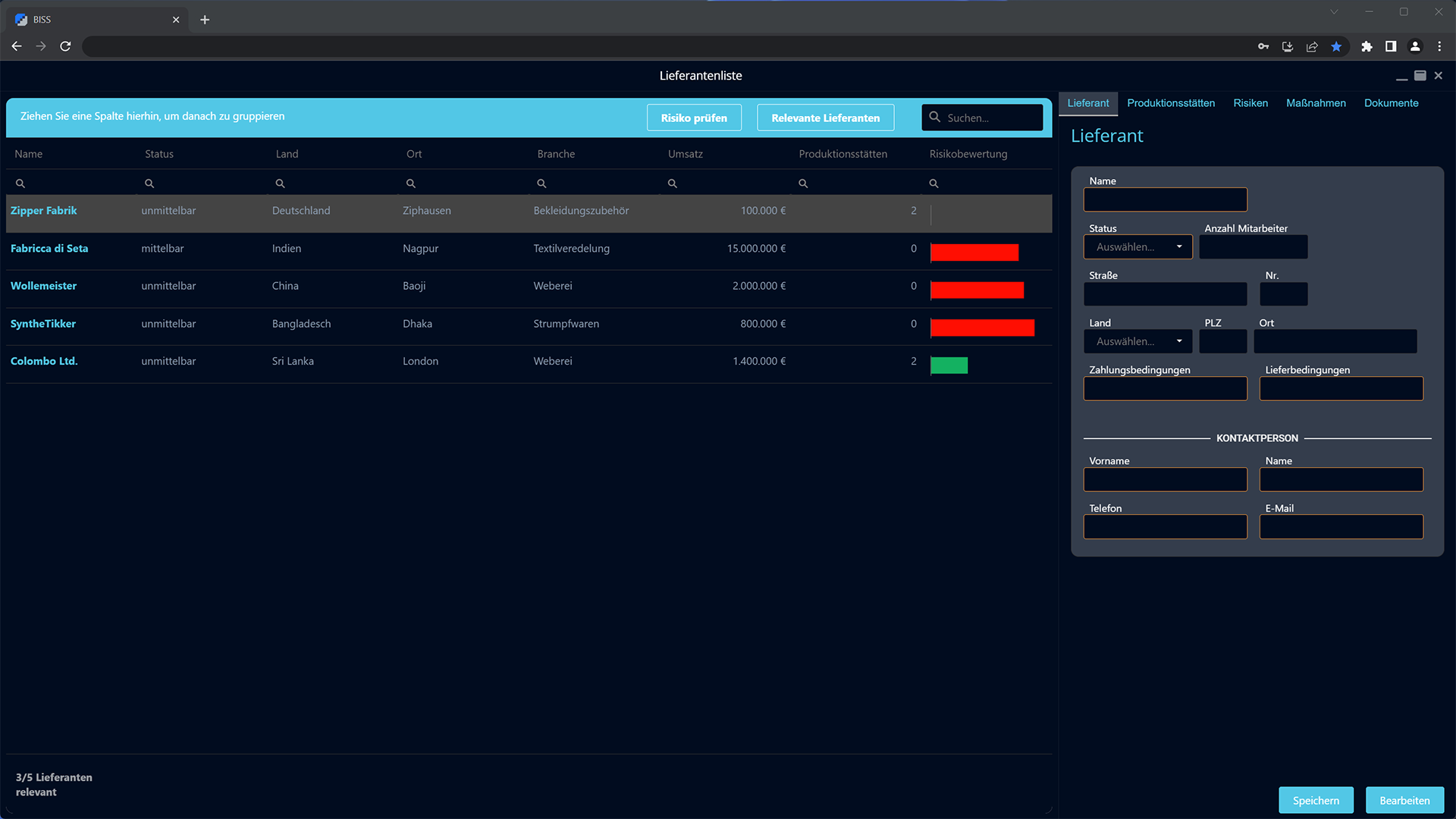
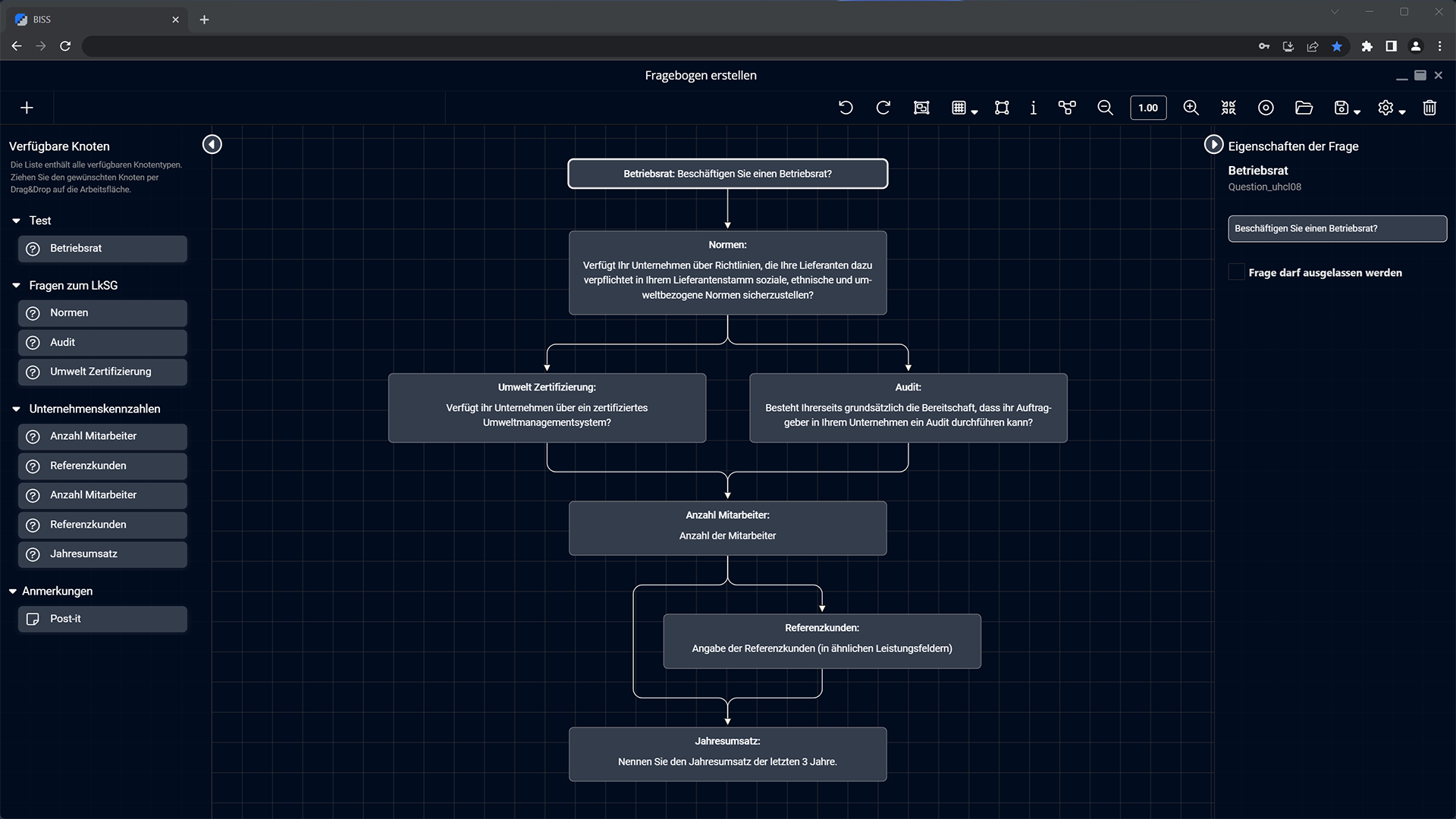
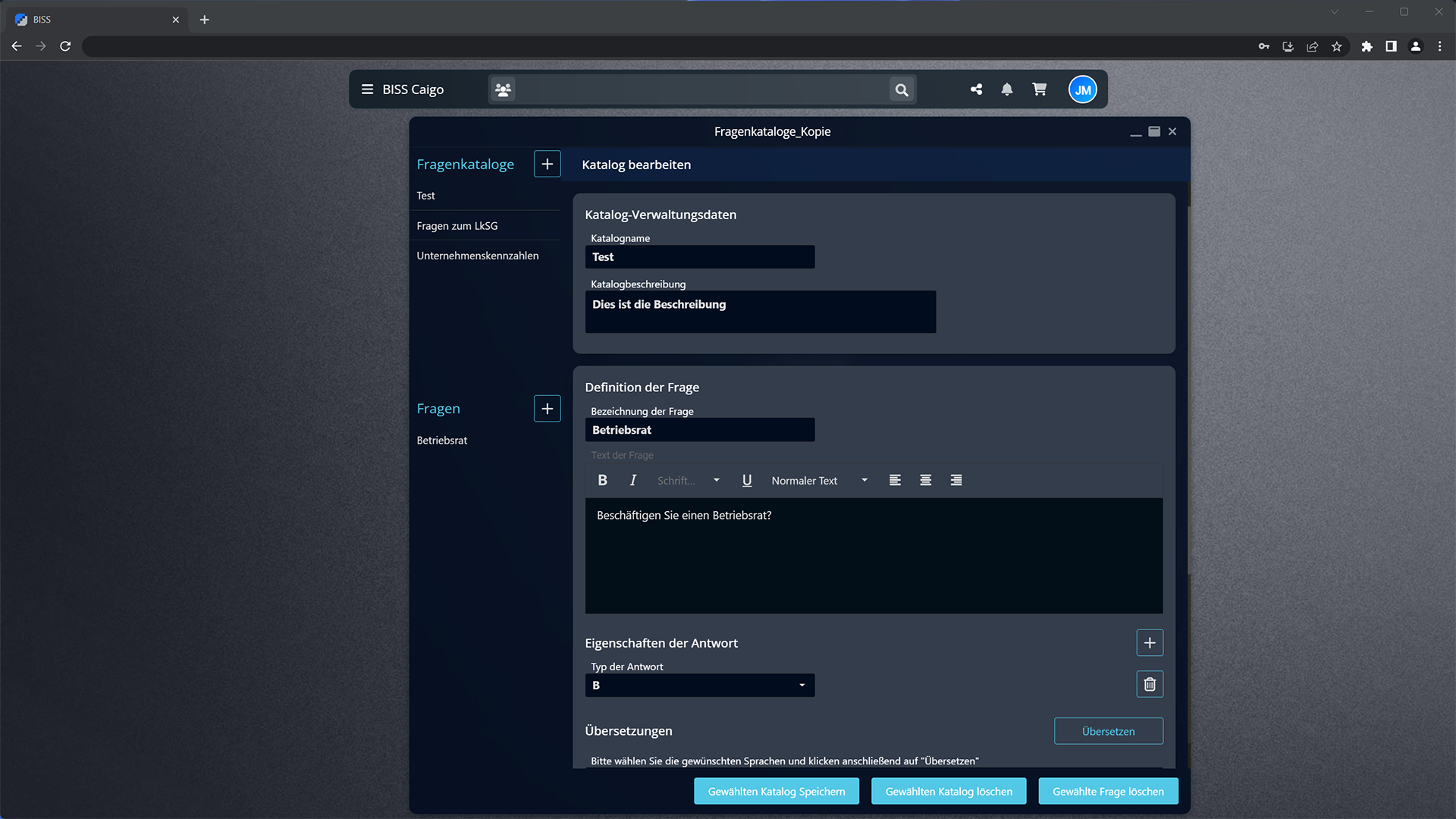
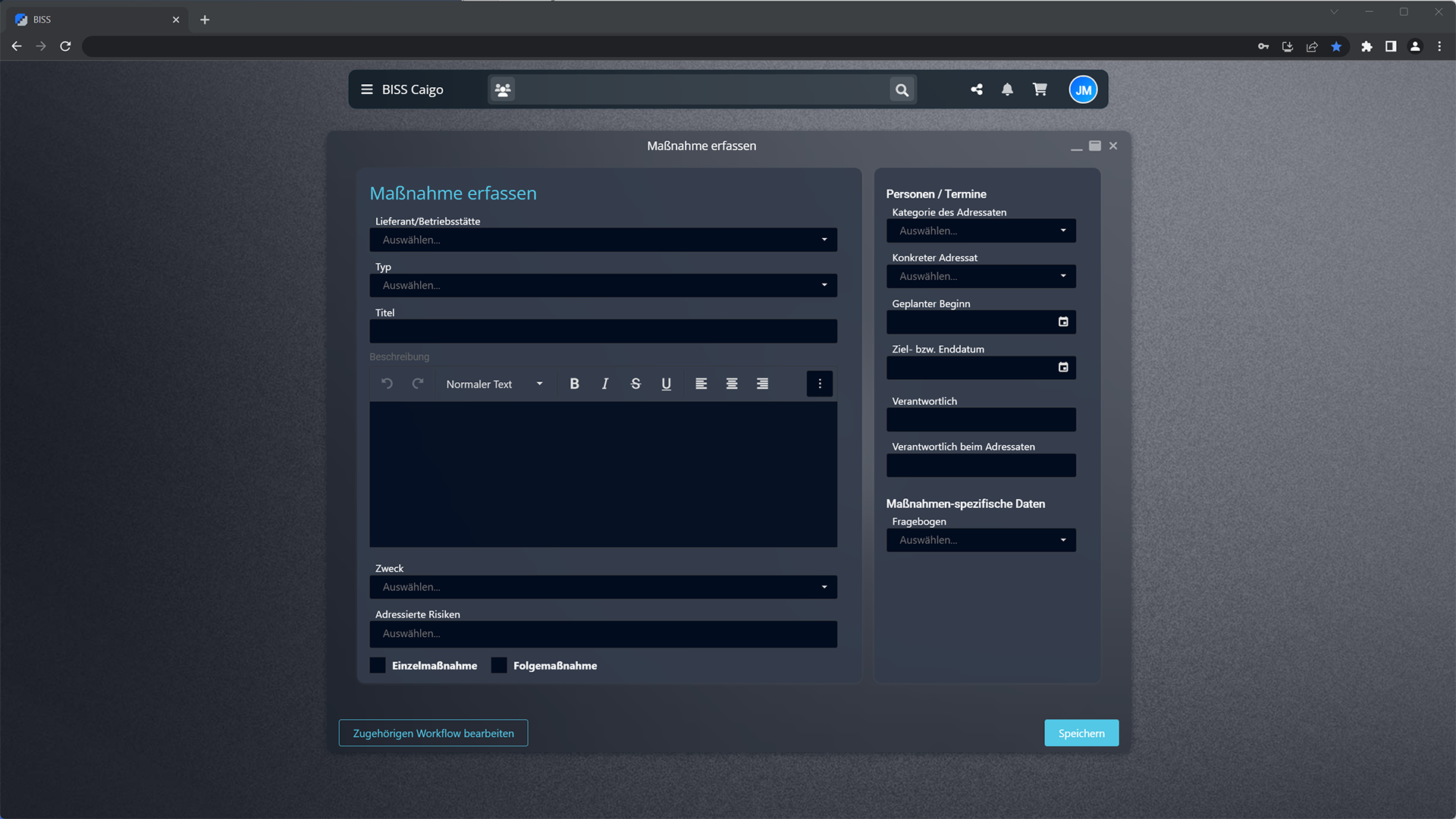


How BISS/CAIGO supports you in implementing the LkSG/CS3D
The requirements of the LkSG/CS3D for the companies concerned are complex. Compliance with the due diligence obligations in relation to supply chains and sustainability cannot be achieved without intelligent LkSG/CSDD software. With BISS/CAIGO, companies can rely on a future-proof solution right from the start.
In brief: The background
What is the LkSG/CSDDD about?
Expected from mid-2024:
Tightening of the LkSG through CSDDD

In brief: The procedure
Knowing the human rights and environmental risks in your own supply chain is key to fulfilling due diligence obligations. The procedure: First, an abstract risk analysis is carried out: In which countries and sectors are there generally which risks? This is based on the Sustainable Development Goals (SDG goals) and 17 ESG criteria. In the next step, the supply partners are subjected to a concrete risk assessment. These are identified using questionnaires.
Companies can use suitable and appropriate contractual agreements to ensure that the supplier introduces measures to avoid identified risks in the future. The philosophy of the LkSG is based on the idea of cooperation between companies within the supply chain. It is important to note that "the LkSG does not establish independent liability standards between contractual partners along the supply chain. Obligated companies should flank contractual assurances with control measures, training and further education on their own responsibility."
(www.bafa.de, page 5)
If risks have been identified in a specific individual case, a proposal for remedial measures should be developed in close consultation with the supply partner in accordance with the criteria of appropriateness and effectiveness.
In this context, it is worth noting that "companies do not have to guarantee that their supply chains are free from risks to and violations of human rights or adverse effects on the environment as part of the duty of care stipulated by the LkSG. Rather, they must be able to prove that they have implemented the due diligence obligations described in more detail in Sections 4 to 10 LkSG."
(www.bafa.de, page 1f.; emphasis added by us)
The companies affected by the LkSG are obliged to establish a procedure that is accessible at all times and protects the confidentiality of the identity of whistleblowers.
BISS/CAIGO modules at a glance
BISS/CAIGO has a modular structure and is offered as a SaaS solution. All data is backed up in the cloud and therefore accessible worldwide. The main modules and features of the BISS/CAIGO supply chain/CSDD software are briefly explained here:

Risk-Hub
A central module that serves as the hub for all risk management activities. The Risk Hub enables the creation and adaptation of risk models based on predefined and customizable models for various legal requirements and different industries. The risk profile of each supplier can be created automatically in the hub.
Supplier module
Supplier management with supplier-specific risk analysis and measures. Suppliers can be loaded into the system either manually or via UpLoad or interface.
Questionnaire module
This module is used to create detailed questionnaires with a variety of question types, including digital signatures and automatic translation into 31 languages, which can be saved in an audit-proof manner. The basis are prepared, modifiable questionnaires with automatic evaluation of the answers.
Measures manager
Action Manager stands for every action in the direction of suppliers. The module is used to efficiently manage measures to remedy identified risks or critical incidents. It offers individually definable action types and workflows so that you can keep track of all actions. Catalogs of measures with different types of measures for risk elimination and prevention are prepared.
Complaint management
This module fulfills the requirements of the EU directives. It also complies with the German Whistleblower Protection Act (HinSchG). It offers all functions for whistleblower and complaint management - in 31 languages - which enables automated and manual processing. It can be adapted to the company's CI guidelines.
Supplier portal
Suppliers have their own portal to view, edit and upload the documents relevant to them.
Dashboard
The dashboard presents the evaluated risk profile of your supplier relationships with regard to selected risks. The weighting of the purchasing volume is broken down for direct and indirect supply partners.
Workflow-/GUI-Designer
A module for defining automated business processes that offers interactive and graphical workflow definitions as well as functional workflow components. The module is also used to create interactive, graphical dialogs. It is fully integrated into workflows and enables a simple connection to the BISS/CAIGO data model.
User/rights management
Flexible definition of user roles and access rights, including visibility settings for groups.
Incident management
AI-supported research in news and specialist portals to identify incidents within the supply chain.
ERP interface (e.g. SAP)
Existing interface for connecting ERP systems. The connection to SAP has already been implemented by a partner.
Reporting function to Bafa*
The interface has already been prepared on the program side.
A central module that serves as the hub for all risk management activities. The Risk Hub enables the creation and adaptation of risk models based on predefined and customizable models for various legal requirements and different industries. The risk profile of each supplier can be created automatically in the hub.
Supplier management with supplier-specific risk analysis and measures. Suppliers can be loaded into the system either manually or via UpLoad or interface.
This module is used to create detailed questionnaires with a variety of question types, including digital signatures and automatic translation into 31 languages, which can be saved in an audit-proof manner. The basis are prepared, modifiable questionnaires with automatic evaluation of the answers.
Action Manager stands for every action in the direction of suppliers. The module is used to efficiently manage measures to remedy identified risks or critical incidents. It offers individually definable action types and workflows so that you can keep track of all actions. Catalogs of measures with different types of measures for risk elimination and prevention are prepared.
This module fulfills the requirements of the EU directives. It also complies with the German Whistleblower Protection Act (HinSchG). It offers all functions for whistleblower and complaint management - in 31 languages - which enables automated and manual processing. It can be adapted to the company's CI guidelines.
Suppliers have their own portal to view, edit and upload the documents relevant to them.
The dashboard presents the evaluated risk profile of your supplier relationships with regard to selected risks. The weighting of the purchasing volume is broken down for direct and indirect supply partners.
A module for defining automated business processes that offers interactive and graphical workflow definitions as well as functional workflow components. The module is also used to create interactive, graphical dialogs. It is fully integrated into workflows and enables a simple connection to the BISS/CAIGO data model.
Flexible definition of user roles and access rights, including visibility settings for groups.
AI-supported research in news and specialist portals to identify incidents within the supply chain.
Existing interface for connecting ERP systems. The connection to SAP has already been implemented by a partner.
The interface has already been prepared on the program side.
* As soon as Bafa has completed the interface, the function can also be used.
With BSS/CAIGO you manage the entire workflow:
Identify risks
- Which risks are relevant for our company?
- According to which criteria are the risks weighted?
Assess risks
- Individual evaluation of country risks and commodity group risks
- Aggregation of country and commodity group risks; classification of risks per supplier
- Formation of supplier risk classes
Develop countermeasures
- Derivation of standardized processes for preventive and remedial measures per supplier risk class
Implement countermeasures
- Conduct supplier audits and sustainability workshops
- Query risk strategies and management plans on supplier side
Risk review
- Continuous risk tracking and risk analysis carried out at least annually
- Documentation of results, e.g. as human rights and sustainability report
- If necessary: Adaptation of processes and measures

Do you need advice on the topic of LkSG implementation?
Our partners in development and consulting

scrm Consulting

Advist

Ososoft
ososoft is a pan-European consulting company with a focus on large IT, SAP and digitalization projects. For years, we have been working trustfully and intensively with our numerous and well-known customers, who are among the "big players" of our focus sectors Retail, Automotive and Industry. We understand their processes and the technologies behind them very well. That is why we usually provide full support, both with strategy and process consulting as well as with technical implementation, thus creating practical solutions.
In the creation of BISS/CAIGO we have brought in our broad process know-how from our years of experience. Our knowledge of the special needs and industry-specific characteristics has found its way directly into the design of Caigo. Our customers from these industries therefore benefit from our experience to a considerable extent, as the LkSG and its provisions are particularly dedicated to them.



